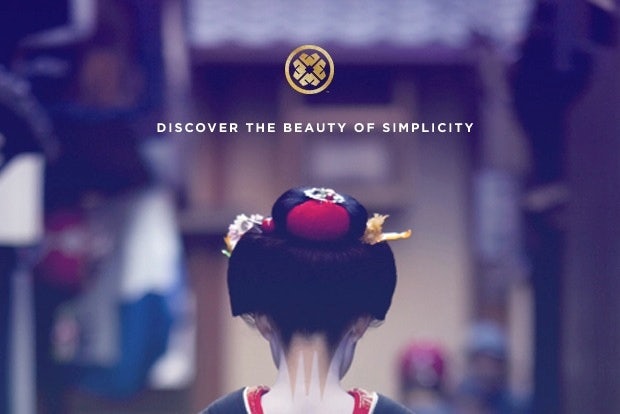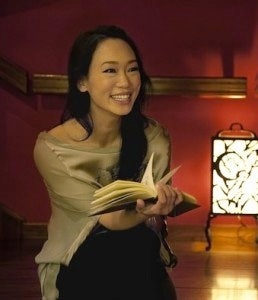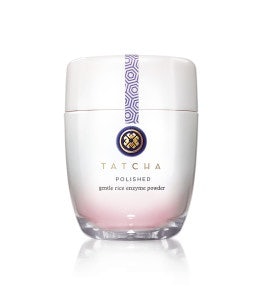Respecting An "Intelligent And Sophisticated" Hong Kong Clientele
#

An ad for Tatcha featuring an image of a geisha, which the company uses frequently in its marketing. (Dr. Onishi)
Beauty company Tatcha started out by selling its Japan- and Chinese traditional medicine-inspired products in the United States at luxury department store Barneys, but it has now made a full circle back to Asia. Jing Daily speaks with founder Vicky Tsai about the recent Hong Kong launch of her geisha-inspired beauty brand, sold exclusively at Joyce Beauty, part of Lane Crawford Joyce Group. The Houston, Texas-bred, San Francisco-based, Harvard Business School graduate founded Tatcha three years ago. In the interview below, she shares her knowledge of marketing to a sophisticated Hong Kong clientele and the differences and similarities between New York and Hong Kong customers.
What made you decide to enter the Hong Kong market? Do you plan to enter the mainland China market?#
The Hong Kong woman is uniquely cosmopolitan, with a foot in the East and in the West. We felt they would truly appreciate our classical, Eastern approach to beauty for the modern woman.
On a personal note, I have spent much time in Hong Kong during my travels to Asia. I have always admired its modernism and rich history; it seemed like the perfect combination for Tatcha.
We are fortunate to have received a warm welcome and look forward to appearing in more Joyce stores later this year.
Over time, it would be a dream come true to bring Tatcha to women all over the world, but for now we want to focus on our existing relationships and locations.

Vicky Tsai. (Miki Chishaki)
Please describe your client profile in the U.S. versus Hong Kong.#
The psychographic is very similar in the U.S. and Hong Kong: she is an educated, well-traveled, cosmopolitan woman with a very open worldview.
However, we have learned that the Hong Kong woman has different skin concerns than the Western woman; she worries about hyperpigmentation more than wrinkles, and breakouts more than dryness. She must also take into account the climate in Hong Kong, particularly its humidity.
What is something unexpected you learned about the skincare business upon entering it three years ago?#
I have found that, even as we continue to grow, our relationship with customers is very intimate. When a woman tells you about her skin, she is telling you about her lifestyle, stress levels, and overall health. We have truly created our brand one person, one face at a time. I’ve learned that despite all the advancements, good old-fashioned customer service is what is important at the end of the day.
What is something unexpected and valuable you learned about the Hong Kong market that differs from the U.S.? What advice would you give to a similar company thinking about entering the Hong Kong market?#
In the U.S., skincare companies cannot make medical claims about their products due to FDA regulations. As a result, American customers are less familiar with the science behind the products and how their skin works at a cellular level.
In contrast, the Hong Kong woman is much more concerned about specific ingredients and how they work. They are overall more informed and sophisticated and view the skin as an organ. They are a much more demanding customer when it comes to technical information, which I appreciate because I spend so much time and effort in that area.
For companies thinking about entering the Hong Kong market, I would advise to respect that these buyers are very sophisticated. They are intelligent and have already heard all of the marketing claims. The best way to connect with them is through sincerity and authenticity.
Do you have plans to expand your offerings to include cosmetics or other products?#
There are seven chapters in the book and skincare is only chapter one—we will certainly be introducing more over time.
In the U.S. you are sold at Barneys. How did you decide with Joyce for Hong Kong?#
We spent a lot of time searching for the perfect partner for us, someone who would help build the brand and maintain a relationship, not just sell it. Joyce was absolutely the best we could find.

One of Tatcha's Japan-inspired skincare products. (Tatcha)
Tatcha revolves around Japanese beauty secrets. Is the marketing for Hong Kong different than in the U.S.? Further down the line, if you plan on having a presence in mainland China, will you deemphasize the brand’s Japanese influence, given historical controversies between the two nations?#
We haven’t felt a need to tweak our image—all of our ingredients and techniques are traced back to Chinese medicine. Our inspiration book was written during a time of heavy Chinese influence in Japan, in artistry, writing, and medicine.
Additionally, all of this information is applicable to women of all ethnicities. We use the image of a geisha because she is a global beauty icon, honing the art of beauty for centuries. Her secrets are the result of many cultures, and can be applied across the world.